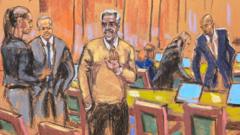Sean "Diddy" Combs' attorneys concluded their defense in a mere 20 minutes during the ongoing sex trafficking trial against him, following significant prosecutorial efforts that lasted nearly seven weeks.
Sean 'Diddy' Combs' Defense Case Concludes in Under 30 Minutes Amidst Sex Trafficking Charges

Sean 'Diddy' Combs' Defense Case Concludes in Under 30 Minutes Amidst Sex Trafficking Charges
Sean 'Diddy' Combs' legal team rests its case swiftly, debating 20 minutes in the high-profile trial.
In a remarkable turn of events, Sean "Diddy" Combs' defense team wrapped up their case in just 20 minutes on Tuesday, after a lengthy trial characterized by extensive testimony from federal prosecutors in New York, who had spent nearly seven weeks building their arguments. The legal team argued that the prosecution failed to substantiate the charges, which Mr. Combs has firmly denied, urging the judge to dismiss the case outright. Notably, Mr. Combs opted not to testify, citing his decision alongside his legal advisors.
In court, he acknowledged Judge Arun Subramanian, stating he is "doing an excellent job" and expressing gratitude to the court. The music mogul faces serious allegations, including sex trafficking and racketeering, and could be sentenced to life in prison if convicted. Prosecutors have accused him of leveraging his celebrity status to run a criminal enterprise that exploited women, and they called over 30 witnesses during their case.
While the defense did not present any witnesses, they introduced text messages between Mr. Combs and ex-girlfriends to support their position that the interactions were consensual and involved willing participants. Notable among these was a message from one participant, referred to as "Jane," expressing enjoyment during their encounters, which Mr. Combs' team described as "freak-offs."
Legal analyst Mitchell Epner suggested the defense's brief presentation was a strategic choice, minimizing potential complications that could arise from calling additional witnesses, especially Mr. Combs himself. His attorney, Alexandra Shapiro, reinforced the notion that the individuals involved were capable of leaving their situations voluntarily, remarking that while Mr. Combs may have exhibited regrettable behavior, it did not equate to sex trafficking.
As the legal proceedings advance, the prosecution contends that the testimonies clearly indicate coercion and manipulation, emphasizing that the ex-girlfriends faced pressures that impacted their consent. With closing arguments anticipated later this week, the trial stands as a pivotal moment for both the defense and prosecution in this complex case.






















